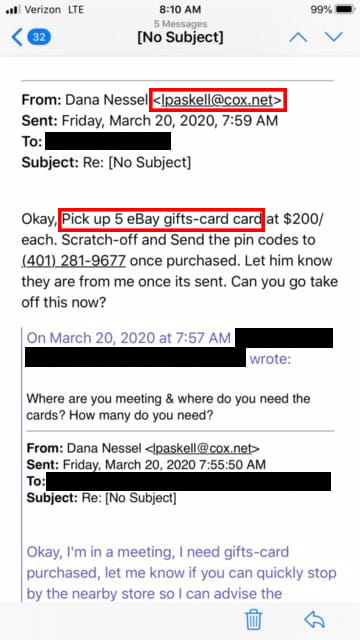The web Browser you are currently using is unsupported, and some features of this site may not work as intended. Please update to a modern browser such as Chrome, Firefox or Edge to experience all features Michigan.gov has to offer.
MI AG Dana Nessel Issues Urgent Consumer Alert on Phishing Emails
March 20, 2020
LANSING – Michigan Attorney General Dana Nessel today issued an urgent reminder to be aware of phishing emails sent by scammers seeking to obtain your personal information and hard-earned money.
No one is immune to these attempts including Michigan’s Attorney General. Staff within the Michigan Department of Attorney General were subjected to a phishing scam today as they were led to believe they had received an email from AG Nessel requesting they purchase eBay gift cards then text the PINs to a specific number.
"This attempt is just another reminder that scammers are relentless and will stop at nothing to bamboozle us out of our hard-earned funds -- even when our country is facing a crisis," said Nessel. "I want to urge all Michiganders to remain on high alert and report any of this behavior to my office."

Although these phishing emails use a certain set of ingredients such as a sense of urgency and believable stories or connections, recipients should pay close attention to the following:
- The name listed on the “from” line is not an indication of who is emailing! Pay close attention to the actual email address. If that email address doesn’t match up with what you know to be correct or is abnormally long, it’s likely a phishing scam.
- The request is asking for money via an unusual payment method: Gifts cards, wire transfers, cash reload cards are a clear indication of a scam.
- Misspelled words or poor grammar in the body of the email are red flags identifying a scam.
Do not reply to suspicious emails. By doing so, a recipient confirms to the sender that they’ve reached a valid email. They will then continue to send spam emails via various email addresses and also attempt to hack the recipient's account. These bad actors have sophisticated software that generates thousands of different email addresses automatically, thus preventing recipients from effectively blocking their attempts. Lastly, as indicated in the attempt sent to the Department’s staff, by replying to the email, scammers will attempt to reach more individuals in an organization by using the recipient's name to keep the scam going.
Do not fall for this! Immediately mark the email as spam and delete it.
Remember, the Attorney General’s Consumer Protection webpage is always available as a resource for consumers to turn to.
Those who wish to make a report about potential scams can do so with the Attorney General’s Consumer Protection team by filing a complaint online or by calling 877-765-8388.
###
Author: